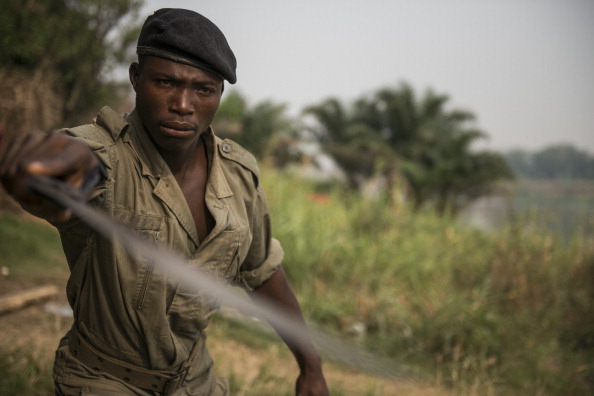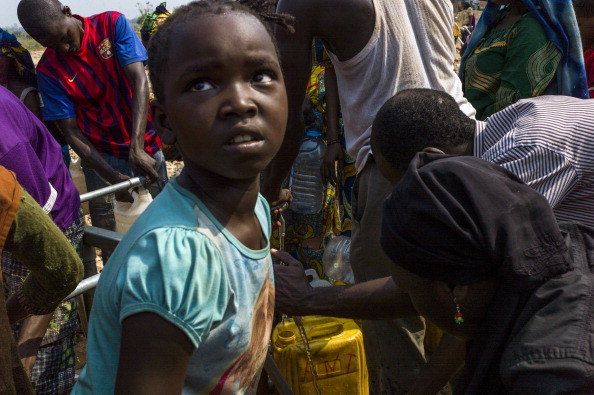Amnesty International’s Donatella Rovera and Joanne Mariner report on the latest massacre in a town West of Bangui, where they saw the remains of dozens of men and women littering the streets and found an 11-year-old girl who had miraculously survived it all.
As if the unfolding horror in the Central African Republic could not get any more shocking, the scene we witnessed in a remote town north-west of Bangui, left us stunned.
We arrived in Bouguere on Feb. 13 to investigate a massacre that had taken place some three weeks earlier. More than 40 people had been killed by anti-balaka militias and most of the town’s Muslim residents had fled.
But on arrival in the town, nothing prepared us for what we found.
And then, we found her. Crouching in the corner of an abandoned house, a girl about 11 years old had survived it all.
They had all been killed in an attack by anti-balaka militias on the morning of February 10, just days before we arrived.
The small bundles of clothing lying where some of the bodies were found meant that people were caught and killed as they tried to flee.
The Muslim area of Bouguere was eerily empty. Most of the houses and businesses had been ransacked and some burned down. Those who had not been killed had fled.
And then, we found her.
Crouching in the corner of an abandoned house, a girl about 11 years old had survived it all. She had been there, alone, without food or water, for four days. She was terrified, could hardly speak and was so weak, she could not even stand.

The Central African Republic has been torn by bloody sectarian clashes since Muslim rebels ousted president Francois Bozize in March 2013 and replaced him with their leader Michel Djotodia, who was himself forced out last month (Photo Credit: Fred Dufour/AFP/Getty Images).
She said her father was killed in the attack, and residents said her mother had been killed earlier assault. The girl was the only Muslim survivor and the Christian residents of the town begged us to take her. We took her to a place of safety.
What happened in Bouguere is was shocking, extremely disturbing, infuriating.
International peacekeepers were nowhere to be seen, even though the area had already witnessed violent confrontations between anti-balaka militias and Seleka forces resulting in the massacre of civilians three weeks earlier.
It was one of those places where something tragic was expected to happen but somehow, the international forces, sent to protect civilians were nowhere to be seen.
Boguere is a mining town, known for its gold and diamond trading, making it particularly attractive to looters.
But these are revenge attacks. Previously, a notorious Seleka commander had made the town his home base, carrying out widespread human rights abuses against the local population and neighboring villages and towns.

The Seleka coup plunged the country into chaos, unleashing a wave of Muslim-Christian violence that has left thousands dead. Hundreds of thousands of people have also been displaced by the brutal surge of killings, mutilations, rapes and looting (Photo Credit: Fred Dufour/AFP/Getty Images).
Christian residents recounted the abuses of the Seleka commander, saying that he once killed an entire family because the father had protected two men whom the commander didn’t like. It was the entire region’s fear and hatred of the commander, they said, that stoked the anger and thirst for revenge that lead to the recent attacks against the town’s Muslim population.
He is believed to have been killed in the massacre on January 24.
Sadly, what happened in Bouguere is not an exception.
The following day, as we drove south to the village of Boboua, we found three bodies lying in front of a mosque. They were the village’s Muslim mayor, Adamou Dewa, his son Abu Bakr and another Muslim resident named Abdou.
As we left, a frantic group of Muslim residents emerged from their hideouts in the bush and flagged down our vehicle. They told us that anti-balaka fighters had attacked their village three hours earlier and killed the three men. They said that there were only 200 Muslims left and they were under serious threat.
“We were born here,” one of them exclaimed, “where can we go?”
It was only then that African Union peacekeepers were arriving to ascertain what had happened. Too late for the dead, and they were not going to stay. With no protection, the remaining Muslim residents will have to leave for their own safety.
Muslims are being brutally murdered or driven away from most towns and villages.
In Mbaiki, for example, only one Muslim family remained, out of a previous population of several thousand.
In Yaloke, once home to an estimated 10,000 Muslims, only 742 remained as of Feb. 13.
The Muslim community of Boda is being protected from attack by French peacekeeping forces, but only as they prepare to to flee the country.
The mass killing of civilians, destruction of homes, businesses and mosques are being used by the anti-balaka to “ethnically cleanse” the Central African Republic of its Muslim population. These are crimes against humanity and war crimes.
Massacres are a disturbing, common feature of the crisis in the Central African Republic. Day after day, men, women and children have been killed with guns and machetes, some left to rot in the streets. Many of those horrors are documented in our latest briefing.
Muslim areas are left empty as the population is forced to flee to neighboring countries.
The International peacekeeping troops have all too often been absent when and where they are needed most. Their deployment has not kept up with the pace of rapidly changing developments on the ground. And at times, they have been reluctant to challenge anti-balaka militias, and slow to protect the threatened Muslim minority.
The international peacekeeping force must break the control of anti-balaka militias and station sufficient and well supported troops in towns and villages where Muslims are threatened.
The whole world is under great chaos. Africa is not a place to have a sound life. The recent massacre again proves how things are going.